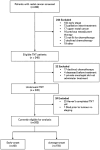Total neoadjuvant therapy in early-onset rectal cancer: A multicentre prospective cohort study
- PMID: 40123409
- PMCID: PMC11931348
- DOI: 10.1111/codi.70059
Total neoadjuvant therapy in early-onset rectal cancer: A multicentre prospective cohort study
Abstract
Aim: The incidence of early-onset (age <50 years) rectal cancer (EORC) is rising globally, often presenting at an advanced stage. Total neoadjuvant therapy (TNT) is increasingly utilised in the management of advanced rectal cancers due to improved response and survival rates. However, it remains unclear whether EORC in an unscreened population responds similarly to TNT compared to average or late-onset (age ≥50 years) rectal cancer (AORC).
Method: This study included consecutive patients treated with curative intent with TNT for rectal cancer at three South Australian hospitals between 2019 and 2024. Patients were divided into EORC and AORC cohorts. The primary outcome was overall complete response (oCR) rate, defined as the proportion of patients who achieved a clinical complete response (cCR) and/or pathological complete response (pCR). Secondary outcomes included compliance and treatment-related toxicity.
Results: Of 202 eligible patients, 48 (23.8%) were in the EORC cohort and 154 (76.2%) in the AORC cohort. No significant difference in oCR rate was observed between EORC and AORC patients (43.8% vs. 37.9%, P = 0.470). cCR, pCR and complete M1 response rates were also similar between the two groups. EORC patients experienced significantly less Grade 3-4 chemotherapy-induced toxicity compared to AORC patients (2.1% vs. 25.3%, P < 0.001), but reported higher rates of patient-reported Grade 3-4 radiotherapy-induced toxicity than AORC patients (31.3% vs. 12.3%, P = 0.004).
Conclusion: EORC patients exhibit comparable overall tumour response rates to AORC patients treated with TNT. However, toxicity profiles differ, with EORC patients experiencing less chemotherapy-induced toxicity but more patient-reported radiation-induced toxicity.
Keywords: average‐onset; clinical complete response; early‐onset; pathological complete response; rectal cancer; total neoadjuvant therapy.
© 2025 The Author(s). Colorectal Disease published by John Wiley & Sons Ltd on behalf of Association of Coloproctology of Great Britain and Ireland.
Conflict of interest statement
The author(s) have no affiliations or financial involvement with any organisation or entity with financial interest. This manuscript was accepted as a poster presentation at the 93rd RACS 2025 Annual Scientific Congress, 3‐6 May 2025 in Sydney, Australia.
References
-
- Kasi PM, Shahjehan F, Cochuyt JJ, Li Z, Colibaseanu DT, Merchea A. Rising proportion of young individuals with rectal and colon cancer. Clin Colorectal Cancer. 2019;18:e87–e95. - PubMed
Publication types
MeSH terms
LinkOut - more resources
Full Text Sources


